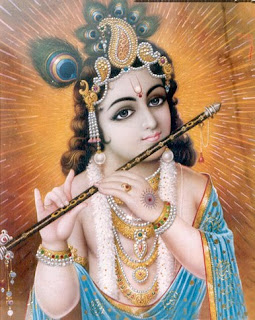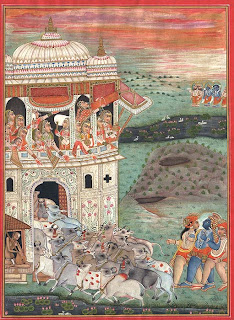The Venu Geet or Song of Lord Krishna's Flute Play is a compilation of 20 shlokas in the twenty-first chapter of the tenth canto in Shrimad Bhagwat. Shri Manohar Baba's moving commentary on Venu Geet in 'Prem Rasamrit Dhara' helps us imbibe the essence of Krishna's message given by the song of His flute play.
Gopis Long to See Krishna When He Returns Home with the Cows
Herein Krishna is revealed as the Supreme Lover towards whom the enraptured village girls with whom He sported in his youth are passionately drawn. The gopis have known Krishna as a child and watched Him grow up and go with the other gopas to graze the soft-eyed cows that were the wealth of their small village. They have waited for Him to return in the evening at the hour of cowdust, playing the flute as he approached.
Krishna Celebrates Nature in Her Most Glorious State
The first five verses of Venu Geet glorify the autumnal month of Kartik. That supreme moment of Krishna's manifestation as human lover and divine incarnate is experienced through a celebration of nature in her most glorious state, in that magical time of the year which comes with Sharad Ritu, the autumnal season. That is when the skies are cleared of heavy black clouds, the waters flow clear and sweet and the air is luminous, and the whole of earth rejoices on being cleansed.
Krishna Breathes Music Into His Flute
In this enchanted season Krishna picks up his flute and breathes music into it. The magical sound fills the gopis with intoxication, peacocks dance, animal stand still entranced, the cows stop grazing. In this state of innocence all the elements of nature are perceived as living, sentient beings: the earth is blessed because Krishna has chosen to walk on her, the bamboo trees are proud that Krishna has chosen them for his music.All of them are filled with one bhava which pervades the atmosphere that of ecstatic devotion or shringara bhakti.
The gopis see Krishna entering the forest of Vrindavan accompanied by His friends wearing a peacock crown and golden garments, in verse 5 of the Venu Geet. He is adorned with flowers in His ears and a forest garland around His neck. Filling the holes of His flute with the nectar of His lips, His entrance is not only into the beautiful forest of Vrindavan, but into the hearts of the gopis.
Gopis Sing the Glories of Krishna's Flute
In the next 14 verses of Venu Geet, the gopis sing the glories of Krishna's flute.The flute in the hands of Krishna is more than a musical instrument. It is the breath of love and a call to eternity. It is the sound of the flute that attracts the cows and draws the gopis, the milkmaids of Vrindavan, out of their homes for a romantic dalliance with Krishna.
The Milkmaids are Jealous of Krishna's Flute
The gopis exclaim in verse 9 of Gopi Geet, “What act of great merit hath this flute performed in consequence of which it is drinking the nectar from the lips of Krishna without leaving the smallest particle for the gopis, the rightful enjoyers of it? What ! Is this more loved even than us, that night and day Krishna continues holding it?...Why did not the lord of Vraja make us flutes so that night and day we had remained with Hari Krishna.” As they stepped into youth, the gopis became intensely desirous of having Krishna's attentions for themselves alone.
Dark-Hued Krishna is Seen as the Object of Longing
When Shri Krishna plays the flute a second time, the enlightenment of the gopis is five-fold. Firstly it is absolute renunciation. When the gopis hear even a single note, they know no other loyalty but to find Krishna even when they know that he is as capricious as the inconstant bee. Hearing the music, the gopis abruptly abandon husbands, children, calves, dinner on the stove to run to him. Heedless of their reputation, the adoration of the village women brings them into the dark forest. Krishna rebukes them and asks them to return to their duties back home.
Gopis Realize that Krishna is Human & Yet Divine
The second step is acquiring knowledge or sankhya. On an autumnal night when Krishna dances with them, He realizes that conceit and pride has affected the gopis' love for him, and He vanishes.With Krishna's disappearance, the gopis experience a depth of despair that carves a new dimension in their love; the gopis learn that Krishna is very much in and of this world yet He is above it, He is human and yet divine.
Soon After, Krishna is Forced to Reappear Before the Gopis
Thirdly when Krishna reappears before the gopis and answers their questions on the different kind of love, He prepares the milkmaids for a love of selfless devotion. “ Your devotion for Me has increased now when you went through the agony of losing Me for a while.” Strangely enough, the gopis find themselves cleansed of their sensual desire for Krishna-as much as the hills and rivers and skies have been cleansed after the rain.
The Progression of the Gopis into Complete Absorption in the Joy of Krishna
Yoga or meditation is the fourth step of enlightenment; a delicately decisive moment in the progression of the gopis towards union with their Lord. No longer in search of satisfaction of their lust alone, stripped of pride and conceit, they urge one another into complete absorption in the joy of Krishna that does not require His human presence.
The Gopis' Devotion Transforms into Perfected Devotion
Finally the cowherdesses' bhakti transforms into parabhakti or perfected devotion. Aching with separation, they begin to know the Krishna that abides in their hearts when they sing His praise and dwells in their longing for Him. They have begun to know their friend not as a separate singular god-like body, but mystically visualize Him as the world around them. And they instinctively renounce the desire for liberation and enlightenment, as well.
Having Imbibed the Essence of His Flute Play, the Gopis Constantly Love Krishna
Having imbibed the essence of His flute play, the milkmaids love Krishna constantly, freely, without purpose. While milking cows, draining curds, washing clothes on riverbanks, they gather in clusters at night to sing the dark God's glories.














No comments:
Post a Comment